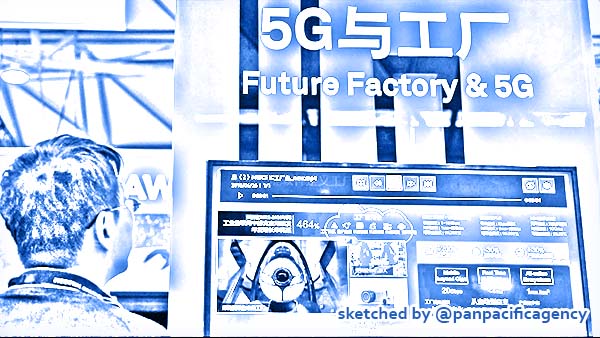No frequency yet available for superfast 5G network in Indonesia

Chinese telecom equipment makers such as Huawei and ZTE hope to dominate the global market for 5G mobile networks. © AP. Sketched by the Pan Pacific Agency.
JAKARTA, Sep 2, 2019, The Jakarta Post. Telecommunications operators are waiting for the government’s decision on the radio spectrum to be used for 5G technology, the fifth generation of the cellular network deemed to be a key factor in the fourth industrial revolution, as it provides faster and broader connectivity, reported The Jakarta Post.
The implementation of 5G would support Indonesia’s push to digitalization especially in preparing itself to enter the Industry 4.0 era, executives of telecommunications-related companies have said.
Networking and telecommunications company Ericsson Indonesia president director Jerry Soper said Indonesia needed to fix the spectrum for 5G so that the latest generation of mobile telecommunications could be implemented in Indonesia.
“We hope the government can provide the frequency for 5G sooner since it will bring advantages for business-to-consumers and business-to-business,” Soper said at an interview session in Jakarta on Aug. 26.
Separately, Qualcomm’s country director for Indonesia, Shannedy Ong, acknowledged that the spectrum allocation could enable industry players to grab opportunities provided by 5G technology.
“Especially for the industrial Internet of Things [IoT] to boost the fourth industrial revolution,” he said at a seminar on telecommunications in Jakarta on Aug. 22.
Claimed to have ultra-low latency, or delay in data transfer, and to be able to connect more devices at the same time, 5G is suitable for industrial purposes.
With 5G, it is possible for us to see automation in manufacturing processes, autonomous driving vehicles, remote surgery, augmented reality and virtual reality, and even smart cities. 5G is also beneficial for the development of the IoT, where interconnected devices reduce the human-to-human or human-to-computer interactions as they could communicate on their own.
In 2022, according to the Indonesian IoT Association, the value of the IoT market in the country will likely reach US$30 billion with more than 400 million sensors connected.
“With 5G, we can experience real-time connection and faster data transfer to support the industrial IoT,” said Toto Suharto, Bosch Indonesia’s managing director, at the seminar.
According to Ericsson’s senior vice president, Jan Karlsson, to embody the evolution from 4G to 5G, telecommunications operators can reuse the same radio and core network. However, to grab the true benefits of 5G, operators need to install a new system.
“Ericsson provides a cloud native system technology so that operators do not have to throw away the existing radio system,” Karlsson said at the interview.
Soper added that the preparation of the core network required a lot of changes and the operators needed to start the work. “Ericsson has collaborated with the biggest operator in Indonesia to develop networks to be ready for 5G,” he said.
If Indonesia is to choose the spectrum, the most common spectrums available in the world for the 5G network will be 2.6 GHz, 3.5 GHz, 26 GHz and 28 GHz.
However, earlier reports said the Communications and Information Ministry would not go with the 3.5 GHz frequency as it had already been used by Indonesian satellites. Another alternative was to use the 2.6 GHz frequency as it was already used globally, but it was being used by a satellite television provider, Indovision, until 2028.
Even though there has been no official decision at the moment, the government is now preparing some policies for 5G, and is expected to participate in the World Radiocommunication Conference in Egypt in November, during which some issues related to telecommunications, including 5G spectrums, will be discussed. Afterward, the government should be able to determine the suitable spectrum for 5G in line with the international consensus in the conference.
In the meantime, several telecommunications providers in Indonesia have been running several tests for 5G development.
Telkomsel, a subsidiary of state-owned PT Telkom, became the first telecommunications operator to test 5G during last year’s Asian Games, followed by Indosat Ooredoo earlier this year by demonstrating the ability of 5G to support virtual reality.
XL Axiata has recently tested 5G in the 28 GHz frequency by demonstrating the use of the network for online gaming and hologram displays. Meanwhile, another provider, Smartfren, has run a 5G test for logistics and manufacturing purposes.
Regarding 5G adoption in the country, the Communications and Information Ministry’s director general for resources, information and equipment, Ismail, said Indonesia had to prepare not only spectrum allocation or other basic technologies, but also 5G technicalities and consumer accessibility.
“Digital transformation is not only about technology, but it is also about culture and mindset,” he told the seminar.
The government would form a special task force for 5G to discuss a partnership model between the government and the industry so that all investments for 5G adoption could be right on target, he added